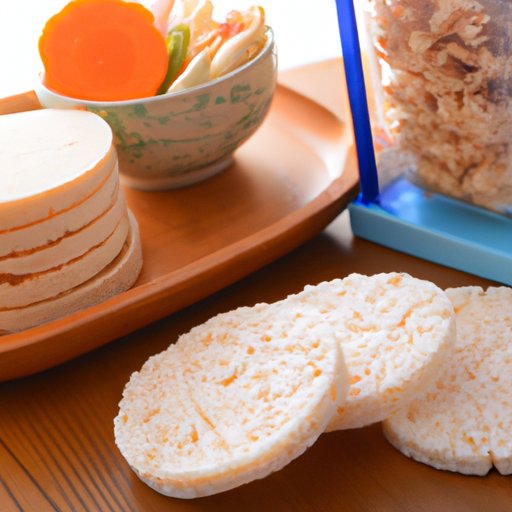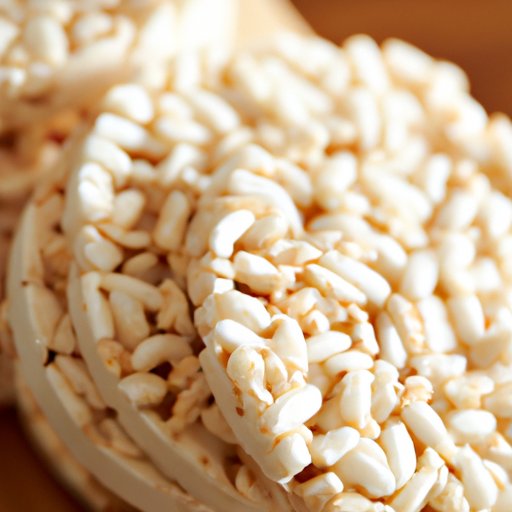Introduction
Rice crackers are a type of snack food made from puffed rice. They come in a variety of shapes, sizes, and flavors, and can be found in most supermarkets and convenience stores. Rice crackers have become increasingly popular in recent years due to their light and crunchy texture, as well as their versatility – they can be enjoyed on their own or paired with other foods. But are rice crackers actually healthy? This article will explore the nutritional benefits and potential health risks associated with eating rice crackers.
Examining the Nutritional Benefits of Rice Crackers
Rice crackers have a few key nutritional benefits. For starters, they are low in fat and calories, making them a great choice for those watching their weight. Rice crackers also provide some dietary fiber, which is important for digestion and overall health. Additionally, many varieties of rice crackers are fortified with vitamins and minerals such as iron and B vitamins, providing a boost of essential nutrients. Finally, rice crackers contain complex carbohydrates, which provide sustained energy throughout the day.
When it comes to comparing rice crackers to other snack options, they tend to fare quite well. For example, when compared to potato chips, rice crackers are lower in fat, calories, and sodium. Similarly, when compared to pretzels, rice crackers are lower in sodium and contain more dietary fiber. All in all, rice crackers provide a relatively nutritious snack option.

Exploring the Health Risks of Eating Rice Crackers
While there are some nutritional benefits to eating rice crackers, there are also some potential health risks associated with them. The first is the sodium content. Many brands of rice crackers contain high amounts of sodium, which can contribute to hypertension and other health problems. Therefore, it’s important to read the nutrition labels of different brands and choose one that is lower in sodium.
Another potential health risk associated with eating rice crackers is the presence of allergens and intolerances. Rice crackers often contain ingredients such as wheat, soy, or dairy, which can cause allergic reactions or digestive discomfort in some individuals. It’s important to check the ingredient list of any rice cracker product before consuming it.
Finally, it’s important to note that rice crackers are still a processed food, meaning that they contain added sugars and fats. Eating too many rice crackers can lead to weight gain, so it’s important to consume them in moderation.

The Pros and Cons of Including Rice Crackers in a Balanced Diet
When it comes to including rice crackers in a balanced diet, there are both pros and cons to consider. On the plus side, rice crackers provide some essential vitamins and minerals, as well as a good source of dietary fiber. They are also low in fat and calories, making them a great choice for those trying to watch their weight. Additionally, rice crackers can be a great way to add variety to your diet, as they come in a variety of flavors and textures.
On the downside, rice crackers are still a processed food, meaning that they contain added sugars and fats. Additionally, many brands of rice crackers contain high levels of sodium, which can be problematic for those with hypertension or other medical conditions. Finally, some people may experience allergic reactions or digestive discomfort from certain ingredients in rice crackers.
Are Rice Crackers an Ideal Healthy Snack Option?
When it comes to making healthy snack choices, it’s important to consider both the nutritional benefits and potential health risks associated with the food. While rice crackers can provide a good source of vitamins and minerals, they are still a processed food, meaning that they contain added sugars and fats. Additionally, many brands of rice crackers contain high levels of sodium, so it’s important to read the nutrition label before purchasing. Finally, some people may experience allergic reactions or digestive discomfort from certain ingredients in rice crackers.
All in all, rice crackers can be a part of a healthy diet, but it’s important to keep in mind the potential downsides. Eating too many rice crackers can lead to weight gain, so it’s important to consume them in moderation. Additionally, it’s best to opt for brands that are lower in sodium and free of common allergens. With these considerations in mind, rice crackers can be a tasty and nutritious snack option.
Conclusion
In conclusion, rice crackers can be a nutritious snack option when consumed in moderation. They provide some essential vitamins and minerals, as well as a good source of dietary fiber. However, it’s important to keep in mind the potential health risks associated with eating rice crackers, such as the high sodium content and potential for allergic reactions. With these considerations in mind, rice crackers can be a tasty and nutritious snack option.
(Note: Is this article not meeting your expectations? Do you have knowledge or insights to share? Unlock new opportunities and expand your reach by joining our authors team. Click Registration to join us and share your expertise with our readers.)
